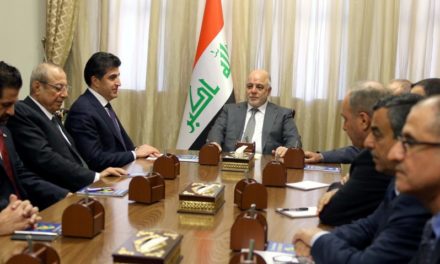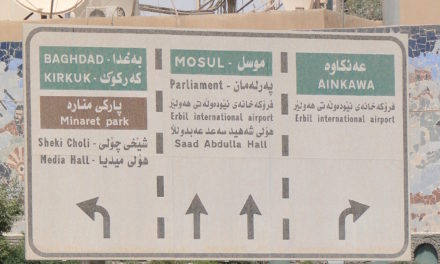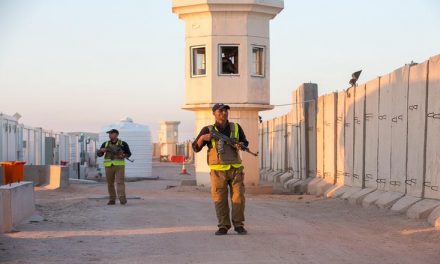Over the past six weeks, two incidents involving politicians visiting Iraqi university campuses have been met with unhappy students protesting their visits. They were dealt with very differently and have raised serious questions and concerns about how the Iraqi state can protect freedom of speech and hold those intolerant to opposing opinions accountable.
The first incident occurred on February 28, when Prime Minister Haider Al-Abadi held his weekly cabinet meeting in Wasit province, south-east of Baghdad. The Prime Minister occasionally holds his cabinet meetings outside the capital to connect with the rest of the country. That day Abadi decided to visit Wasit University after the cabinet meeting but was met with a group of protestors on campus. The students were mostly Sadrists that were keeping in line with the protest movement that Muqtada Al-Sadr has been encouraging in Baghdad’s Tahrir Square.
Despite being attacked by protestors, Abadi maintained his composure in his address at the university and invited students and faculty to Baghdad five days later to hear their concerns and address the reasons for protesting his visit to Wasit University. Abadi highlighted the importance of keeping protests peaceful in response to the attacks on his convoy while also reminding his audience that most states at times of war suspend the right to protest, while his government has ensured the safety of protestors for over two years. Abadi’s diplomatic response to the protestors was welcoming and sent a strong message to the students by being invited and heard instead of facing repercussions. Unfortunately the same could not be said to a similar incident that occurred five weeks later.
Leader of Asaib Ahl Al-Haq (AAH), Qais Al-Khaz’ali visited Qadisiyah University on April 10, in an attempt at early election campaigning. Like Abadi before him, he was met with a group of students protesting his visit. This time the majority of the students were “left leaning” and anti-Islamist. They chanted anti-Iran and pro-nationalist slogans as they successfully prevented Khaz’ali from addressing the university. Unlike Abadi, Khaz’ali’s response however was not diplomatic. Later that night the office of the Iraqi Communist Party in Qadisiyah was attacked due to the fact that the students who had protested Khaz’ali were ideologically aligned with the left like the Communist party, though not necessarily associated with one another.

Khaza’ali guards pointing their weapons at students.
Fortunately, no one was hurt and an investigation is in place to examine who was responsible for the violent act. However, it is all but confirmed that the attackers were from Khaz’ali’s AAH. There are multiple concerns to this latest incident. Khaz’ali may not be prime minister, but he is still a political leader and his party holds two seats in parliament making them part of the political process as a whole. What is more concerning is the fact that AAH are a significant part of the Popular Mobilization Forces (PMF) that are being incorporated as another branch of the Iraqi Security Forces.
This is very concerning as political parties like AAH grow more popular, it naturally means they will also face louder opposition over time. This creates greater responsibility for the state to ensure that freedom of speech is tolerated, so how is the government going to manage this situation? Similar scenarios are more likely to reoccur as we near both provincial and parliamentary elections.
As a result of these incidents, Prime Minister Abadi reportedly instructed the minister of higher education to draw up a proposal that limits access of politicians to university campuses across Iraq in order to separate politics from education as well as to prevent any further incidents that may turn violent. This decision is only one piece of the answer because it only addresses politics on campus but does not address the lack of respect for freedom of speech among many political groups, some of which now have armed men as part of the state’s security forces.
Various government officials have stated the imperative of excluding paramilitary groups from engaging in the political process and running for elections. However, this has been sidestepped by many politicians like Muqtada Al-Sadr, for example, with his “separate” military arm Saraya Salam and his political party Ahrar. Other examples are Hadi Al-Ameri’s Badr organization and the Kurdish parties and their armed men under the umbrella of the Peshmerga. This raises a serious threat to the principles of democracy if citizens have to be wary of their political opinions because the Iraqi state is unable to control political parties with armed wings.

Hamzeh Hadad
Hamzeh Hadad is an Iraqi writer and commentator. He holds a Bachelor of Arts with honours from the University of King’s College.










